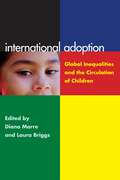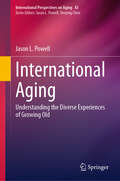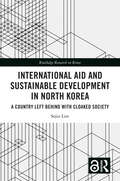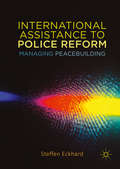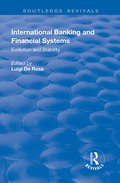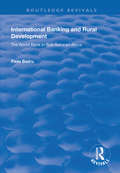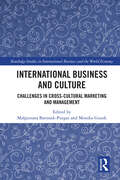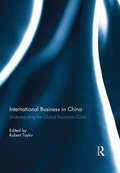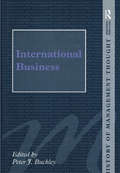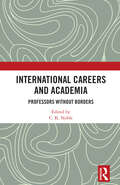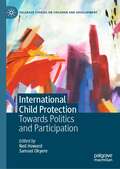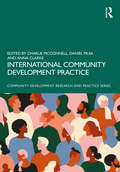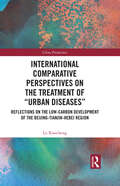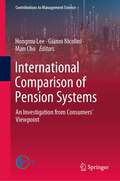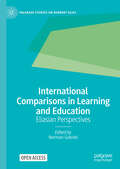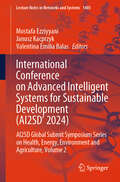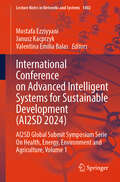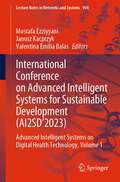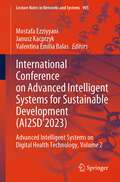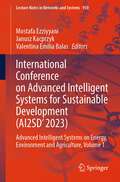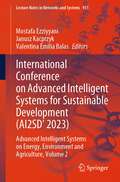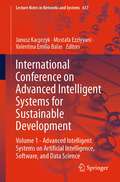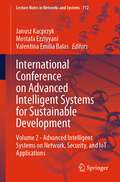- Table View
- List View
International Adoption: Global Inequalities and the Circulation of Children
by Laura BriggsIn the past two decades, transnational adoption has exploded in scope and significance, growing up along increasingly globalized economic relations and the development and improvement of reproductive technologies. A complex and understudied system, transnational adoption opens a window onto the relations between nations, the inequalities of the rich and the poor, and the history of race and racialization, Transnational adoption has been marked by the geographies of unequal power, as children move from poorer countries and families to wealthier ones, yet little work has been done to synthesize its complex and sometimes contradictory effects.Rather than focusing only on the United States, as much previous work on the topic does, International Adoption considers the perspectives of a number of sending countries as well as other receiving countries, particularly in Europe. The book also reminds us that the U.S. also sends children into international adoptions—particularly children of color. The book thus complicates the standard scholarly treatment of the subject, which tends to focus on the tensions between those who argue that transnational adoption is an outgrowth of American wealth, power, and military might (as well as a rejection of adoption from domestic foster care) and those who maintain that it is about a desire to help children in need.
International Aging: Understanding the Diverse Experiences of Growing Old (International Perspectives on Aging #43)
by Jason L. PowellAs the world undergoes huge demographic shifts with aging populations and increasing life expectancy, it is essential to recognize the importance of understanding aging in different international, cultural, social, and economic contexts. This book aims to explore the diverse experiences of growing older across various regions and societies. By adopting an international perspective, this book will critically analyze the unique challenges and opportunities that arise in different aging populations in Asia, Americas, EU and Africa. Through this exploration, readers can gain a deeper understanding of aging and develop more effective strategies to support older individuals across the globe relating to pensions, employment, care and leisure. The purpose of this book is to shed light on the diversity of aging experiences internationally and examine the cultural, social, economic, and public policy factors that shape these experiences. By adopting an international approach, this book illuminates the variations in expectations, perceptions, and practices related to aging. This book seeks to promote a broader understanding of aging that goes beyond singular narratives and encourages the development of inclusive and contextually relevant approaches to aging and care.
International Aid and Sustainable Development in North Korea: A Country Left Behind with Cloaked Society (Routledge Research on Korea)
by Sojin LimThis book examines international aid in North Korea, in particular the ongoing policy of withholding aid, through the lens of the impact on the general population to present an argument for sustainable development. Focusing on the human rights of North Koreans and presenting a case for the use of aid as a provision for social change, it explores an alternative narrative to the existing long-drawn-out rhetoric of ‘denuclearisation-first’. The book’s scope includes evaluations of the causes of international sanctions and their impact, the Kim regime’s mitigation of sanctions through marketisation and a digital economy as well as barriers to aid monitoring and the reason for the absence of any mass anti-regime movement. It also posits that North Korea is a fragile state but cloaked by the image of a strong regime. The book succinctly demonstrates that the key to unlocking the potential of North Korea’s ‘cloaked society’ does not lie in sanctions, but is to be found in engagement with development aid. As such it will appeal to students of Korean Studies, Development Studies, Asian Politics and International Relations.
International Aid and Sustainable Development in North Korea: A Country Left Behind with Cloaked Society (Routledge Research on Korea)
by Sojin LimThis book examines international aid in North Korea, in particular the ongoing policy of withholding aid, through the lens of the impact on the general population to present an argument for sustainable development.Focusing on the human rights of North Koreans and presenting a case for the use of aid as a provision for social change, it explores an alternative narrative to the existing long-drawn-out rhetoric of ‘denuclearisation-first’. The book’s scope includes evaluations of the causes of international sanctions and their impact, the Kim regime’s mitigation of sanctions through marketisation and a digital economy as well as barriers to aid monitoring and the reason for the absence of any mass anti-regime movement. It also posits that North Korea is a fragile state but cloaked by the image of a strong regime.The book succinctly demonstrates that the key to unlocking the potential of North Korea’s ‘cloaked society’ does not lie in sanctions, but is to be found in engagement with development aid. As such it will appeal to students of Korean Studies, Development Studies, Asian Politics and International Relations.The Open Access version of this book, available at http://www.taylorfrancis.com, has been made available under a Creative Commons [Attribution-Non Commercial-No Derivatives (CC-BY-NC-ND)] 4.0 license.
International Assistance to Police Reform
by Steffen EckhardThis book comparespolice reform operations in Kosovo and Afghanistan, addressing the internalmachinery that makes peace operations work--or not. Recognizing that the chancesfor effective peacebuilding vary widely across contexts, this book investigatesthe impact of one of the few variables that peacebuilders do control: themanagement and design of peace operations. Building on fieldresearch and over one hundred expert interviews, Internationalassistance to police reform: Managing Peacebuilding systematically compares such operations in twodifferent contexts--Kosovo and Afghanistan--by focusing specifically oninternational assistance for local police reform since 1999. Four comprehensivecase studies examine operations in Kosovo and Afghanistan before and after theEuropean Union took over police reform responsibilities: in Kosovo from the Organization for Security and Co-operationin Europe (OSCE) and in Afghanistan from the German government. Speaking toscholars and practitioners in domestic and international organizations, the bookdrills in the complex relation between headquarter diplomats and field levelconflict experts. Its findings combine to a set of recommendations forpolicy-makers to better align their operations to the contentious politics ofconflict management and peacebuilding.
International Banking and Financial Systems: Evolution and Stability
by Luigi De RosaThis title was first published in 2003. In this volume of essays - based on papers delivered to 2001 conference, International Banking and Financial Systems - leading European bankers and banking historians give their assessment of the evolution of central banking in 20th-century Europe. As well as providing a historical perspective, the volume also explores how the lessons of the 20th century may be brought to bear on current and future trends in central banking. In so doing, this volume provides an insight into the ways in which economic stability and growth has been, and can be, promoted.
International Banking and Rural Development: The World Bank in Sub-Saharan Africa (Routledge Revivals)
by Pade BadruPublished in 1998, this book reviews two of the World Bank's agricultural development projects in southeast Nigeria, and concludes that the objectives of these projects - which include reducing rural poverty and developing indigenous capacity for rural development - have not been fully realized. This book concludes that what these projects have achieved in the past, was the increasing integration of the peasant's political economy into the world's capitalist market with negative consequences. For example, the projects emphasis on export crop production, as opposed to food production, simply led to a diminishing capability among peasant farmers especially in the project areas, to produce food for themselves - while at the same time, reporting increased productivity in export-related production. The end result is widespread poverty amongst the poorest strata of peasant farmers participating in the program. In addition, the book looks at the Bank's structural adjustment programme, which in fact has the potential to reduce whatever benefits its agricultural programs might bring about for peasant producers.
International Business and Culture: Challenges in Cross-Cultural Marketing and Management (Routledge Studies in International Business and the World Economy)
by Małgorzata Bartosik-Purgat Monika GuzekInternational Business and Culture: Challenges in Cross-Cultural Marketing and Management explores the intricate relationship between culture and business, offering valuable insights for both practitioners and scholars. The authors delve into the profound impact of cultural dimensions on various aspects of international business, marketing, human resource management, and organisational structure. They examine the theoretical frameworks underpinning these studies through a meticulous narrative literature review and case studies.The significance of understanding cultural influences on business decisions becomes paramount in an increasingly interconnected world. The book addresses challenges faced by companies operating across diverse cultures, emphasising the need for adaptation in international marketing and management. Based on practical examples, the research focuses on identifying the most culturally sensitive areas in international business and explores the crucial cultural determinants influencing engagement with foreign markets.The book's theoretical background spans international business, marketing, and management, and it is intertwined with cultural concepts from Hofstede and Hall. It consists of 16 chapters covering marketing and communication strategies across cultures, cultural aspects of international business and cross-cultural management based on practical examples of Duracell, Inc., PepsiCo, Volkswagen, VELUX Group, and Amica Group, among others.The book highlights the undeniable interconnectedness of culture and business. As businesses expand internationally, the symbiotic relationship between culture and business remains a pivotal factor influencing success and growth.
International Business in China: Understanding the Global Economic Crisis
by Robert TaylorThis book deals with a number of contentious issues in Chinese management as China emerges as a global economic player, with a greater role in international business during a global economic crisis. This step is in tandem with an economically driven foreign policy. Since the 1980s, Chinese management while still in transition, has benefited from an infusion of capital, technology and managerial expertise through inward direct investment via joint and wholly-owned foreign ventures. As the so-called 'workshop of the world', China and its exports, especially labour-intensive goods, face protectionism in the United States and the European Union. To circumvent these barriers, the Chinese leaders are emphasising domestic consumption, itself dependent on rising personal income levels and an improved national social insurance system, and a move to high-tech products, themselves requiring indigenous innovation. The creation of a knowledge economy, in addition to outward investment in manufacturing, could lead to a distinctive independent style of Chinese management. Simultaneously, China’s participation in intra-regional trade underlines the nation’s role in Asian regional business networks. Such developments in turn present a challenge to Western and global business. This book was published as a special issue of Asia Pacific Business Review.
International Business: Economics And Anthropology, Theory And Method (Routledge Revivals Ser.)
by Peter J. BuckleyThis book was published in 2003.Over the years the challenges of international business in organisation and culture have been one of the most intriguing issues facing managers. Attempts at organisational innovation have tried to strike a balance between local markets' responsiveness and global efficiency. This book presents an overview of changing attitudes to the globalization of the firm and traces the increasing sophistication of management techniques necessary to cope with the increasing complexity of business world wide. It contains readings on the management of international business from 1936 to 1998. Looking at managing abroad and the internationalism of firms including issues of appraising foreign investment opportunities, the foreign investment decision process and the evolution of the multinational enterprise. The operations and planning of the multinational firm are surveyed over time from early models of "Headquarters and Subsidiary" to global strategies. The key issues of international strategic alliances and joint ventures are also examined; concluding with approaches to forward looking international management.
International Careers and Academia: Professors without Borders
by C. K. NobleWhile the topic of international careers and academia has received significant interest, the real contextual opportunities and barriers remain hidden by a dreadful reality across countries, contexts and international virtual spaces in greater numbers than ever before. This book integrates current debates of exposure to diversity and multiculturalism with different perspectives from authors with academic affiliations in 14 countries. It covers topics on intellectual, language and cultural diversity and offers a theory for the global value chain of academia and for the careers of international scientists. The aim is to achieve a holistic transformation with several possible courses of action useful to all involved in academia.The book also provides an overview of international scientific careers across different career stages based on lived experiences. This type of international geographical mobility needs more than supportive host institutions and requires international networks and relationships of trust.The book is a must-read for all involved in diversity and multiculturalism in higher education in different countries. It provides important insights to those engaged in academia and in international careers as scientists.
International Child Protection: Towards Politics and Participation (Palgrave Studies on Children and Development)
by Neil Howard Samuel OkyereThis book interrogates the international child protection regime, with a particular focus on its weaknesses and failures. It looks at the lack of accountability, the normativity, and the tendency to recreate patterns of power and exclusion that blight otherwise good intentions. The book assesses why the regime falls short of its ideals and offers ideas for what can be done to improve it. Bringing together influential, established voices, and emerging scholars who work on issues related to childhood, youth, policy, and practice, the book offers a timely intervention that aims to push the world of international child protection in more progressive directions.
International Communism and the Spanish Civil War
by Lisa A. KirschenbaumInternational Communism and the Spanish Civil War provides an intimate picture of international communism in the Stalin era. Exploring the transnational exchanges that occurred in Soviet-structured spaces - from clandestine schools for training international revolutionaries in Moscow to the International Brigades in Spain - the book uncovers complex webs of interaction, at once personal and political, that linked international communists to one another and the Soviet Union. The Spanish Civil War, which coincided with the great purges in the Soviet Union, stands at the center of this grassroots history. For many international communists, the war came to define both their life histories and political commitments. In telling their individual stories, the book calls attention to a central paradox of Stalinism - the simultaneous celebration and suspicion of transnational interactions - and illuminates the appeal of a cause that promised solidarity even as it practiced terror.
International Community Development Practice (Community Development Research and Practice Series)
by Anna Clarke Charlie McConnell Daniel MuiaInternational Community Development Practice provides readers with practice-based examples of good community development, demonstrating its value for strengthening people power and improving the effectiveness of development agencies, whether these be governmental, non-governmental or private sector. The chapters focus upon the making of the community development profession and the eight core competences required of the professional practitioner, as outlined by the International Association for Community Development (IACD), whatever their job title or host agency, in order to be able to undertake community development. These are concerned with the ability of the practitioner to: Put ethics and values into practice Engage with communities Ensure participatory planning Organize for change Support learning for change Promote diversity and inclusion Build leadership and infrastructure Develop and improve policy and practice From a policy perspective, the book will reassert the role of community development approaches as related to a wide variety of global challenges, including poverty amelioration, climate change, human rights, peace building and social, environmental, political and economic development. From a practice perspective, the book will reassert the importance of high levels of professional competence building upon decades of experience in the field around the world by development practitioners working in community work, social work, health, adult education, environmental protection, local economic development, urban design, cultural work and other disciplines concerned to support effective community development.
International Comparative Perspectives on the Treatment of “Urban Diseases”: Reflections on the Low-Carbon Development of the Beijing-Tianjin-Hebei Region (China Perspectives)
by Lu XiaochengWith an integration of theories, comparative and empirical studies, this book aims to find a treatment for Beijing’s “urban diseases” and coordinate a low-carbon development plan for the Beijing-Tianjin-Hebei region in China. Unprecedented industrialization and unconventional urbanization caused a series of “urban diseases” for developing cities across the globe. By summarizing and exploring the evolution and phased characteristics of “urban diseases”, the author implements theories across classical sociology, human ecology, community school, and low-carbon city as the base for policy recommendations. This book also provides in-depth examinations and comparative studies of other metropolises’ experiences in controlling “urban diseases”. Cities such as New York, London, and Tokyo were modeled to propose the most appropriate low-carbon development plan for the Beijing-Tianjin-Hebei region. With a focus on developing cities in Northern China, this book will be a great read to all scholars and students of environmental studies, development studies, urban studies, and contemporary China studies. It will also be a great addition for those who are interested in social conflicts and economic development.
International Comparison of Pension Systems: An Investigation from Consumers’ Viewpoint (Contributions to Management Science)
by Man Cho Gianni Nicolini Hongmu LeeThis book is about retirement income security. This income security is provided by national public pensions, corporate pensions, and individual and reverse mortgages. However, these systems vary greatly from country to country and, in many countries, do not provide sufficient coverage. Ensuring income security in old age is an important issue that must be resolved in the rapidly aging environment of the world.From the perspective of financial consumers, this book cross-sectionally surveys public pensions, corporate pensions, individual pensions and reverse mortgages and compares them among many important nations. This gives many implications from the perspective of designing an overall income security for each individual. In addition, it presents many of the issues needed for these sustainable and comprehensive income security.
International Comparisons in Learning and Education: Eliasian Perspectives (Palgrave Studies on Norbert Elias)
by Norman GabrielThis Open Access edited volume addresses the important role of education in society through the lens of theoretical concepts developed by Norbert Elias. This book sets out to challenge dominant perspectives within the sociology of education by reorientating traditional debates about socialisation, childhood, early years education, care, schooling and the curriculum, focusing on the relational learning processes that lie at the heart of pedagogic relationships between parents, teachers, children and peers. It also offers an innovative perspective on some of the key debates in childhood studies, bringing together and relating the different aspects of childhood through a generational lens. Authors from different countries follow young children as they grow up and learn how to become civilized in institutions in contemporary society, discussing how from one generation to the next they learn from adults and their peers an enormous social fund of knowledge about their world.
International Conference on Advanced Intelligent Systems for Sustainable Developent: AI2SD Global Submit Symposium Series On Health, Energy, Environment and Agriculture, Volume 2 (Lecture Notes in Networks and Systems #1403)
by Janusz Kacprzyk Valentina Emilia Balas Mostafa EzziyyaniThis book provides a dynamic platform for exploring groundbreaking advancements in intelligent systems for sustainable development. It offers readers&’ access to the latest technologies and innovative solutions that address global challenges. Bringing together leading academics, pioneering researchers, and industry leaders fosters knowledge exchange across various fields such as health, education, agriculture, energy, and security. It enables readers to gain valuable insights, build strategic partnerships, and contribute to shaping a more sustainable future. This book bridges scientific research with practical applications and is ideal for researchers, practitioners, and decision-makers, driving progress across multiple disciplines.
International Conference on Advanced Intelligent Systems for Sustainable Development: AI2SD Global Submit Symposium Serie On Health, Energy, Environment and Agriculture, Volume 1 (Lecture Notes in Networks and Systems #1402)
by Janusz Kacprzyk Valentina Emilia Balas Mostafa EzziyyaniThis book provides a dynamic platform for exploring groundbreaking advancements in intelligent systems for sustainable development. It offers readers&’ access to the latest technologies and innovative solutions that address global challenges. Bringing together leading academics, pioneering researchers, and industry leaders fosters knowledge exchange across various fields such as health, education, agriculture, energy, and security. It enables readers to gain valuable insights, build strategic partnerships, and contribute to shaping a more sustainable future. This book bridges scientific research with practical applications and is ideal for researchers, practitioners, and decision-makers, driving progress across multiple disciplines.
International Conference on Advanced Intelligent Systems for Sustainable Development: Advanced Intelligent Systems on Digital Health Technology, Volume 1 (Lecture Notes in Networks and Systems #904)
by Janusz Kacprzyk Valentina Emilia Balas Mostafa EzziyyaniThis book encapsulates the innovative discussions held during the International Conference on Advanced Intelligent Systems for Sustainable Development (AI2SD'2023), which took place at Mohammed 6 University of Sciences and Health Casablanca, Morocco. This book delves into the multifaceted realm of advanced intelligent systems, specifically focusing on digital health technology. The book offers a comprehensive exploration of cutting-edge research and breakthroughs in this dynamic field, providing a holistic perspective on the latest advancements. Within these pages, you will find papers covering an array of captivating topics, including AI-driven diagnostics, wearable health devices, predictive analytics in health care, and much more. Each contribution delves into the synergy of intelligent systems and digital health, showcasing how these technologies intertwine to shape the future of healthcare. Designed for researchers, practitioners, and enthusiasts alike, this book serves as an invaluable resource for staying updated on the latest trends and developments in the intersection of advanced intelligent systems and digital health technology. Whether you are seeking to broaden your knowledge or seeking practical insights, this book caters to a diverse readership eager to harness the potential of these innovative domains.
International Conference on Advanced Intelligent Systems for Sustainable Development: Advanced Intelligent Systems on Digital Health Technology, Volume 2 (Lecture Notes in Networks and Systems #905)
by Janusz Kacprzyk Valentina Emilia Balas Mostafa EzziyyaniThis book encapsulates the innovative discussions held during the International Conference on Advanced Intelligent Systems for Sustainable Development (AI2SD'2023), which took place at Mohammed 6 University of Sciences and Health Casablanca, Morocco. This book delves into the multifaceted realm of advanced intelligent systems, specifically focusing on digital health technology. The book offers a comprehensive exploration of cutting-edge research and breakthroughs in this dynamic field, providing a holistic perspective on the latest advancements. Within these pages, you will find papers covering an array of captivating topics, including AI-driven diagnostics, wearable health devices, predictive analytics in health care, and much more. Each contribution delves into the synergy of intelligent systems and digital health, showcasing how these technologies intertwine to shape the future of healthcare. Designed for researchers, practitioners, and enthusiasts alike, this book serves as an invaluable resource for staying updated on the latest trends and developments in the intersection of advanced intelligent systems and digital health technology. Whether you are seeking to broaden your knowledge or seeking practical insights, this book caters to a diverse readership eager to harness the potential of these innovative domains.
International Conference on Advanced Intelligent Systems for Sustainable Development: Advanced Intelligent Systems on Energy, Environment and Agriculture, Volume 1 (Lecture Notes in Networks and Systems #930)
by Janusz Kacprzyk Valentina Emilia Balas Mostafa EzziyyaniThis book is a comprehensive compilation of groundbreaking insights stemming from the esteemed International Conference on Advanced Intelligent Systems for Sustainable Development (AI2SD'2023), hosted at Cadi Ayyad University Morocco. Focused on the crucial themes of energy, environment, agriculture, and industry, this book captures the essence of transformative discussions and cutting-edge research that unfolded during the conference. Within these pages, readers are invited to explore the intricate world of intelligent systems, where innovation converges to tackle the key challenges of sustainability. The book immerses its audience in a wealth of knowledge that deeply represents the latest advancements shaping the future landscape. Diverse topics are intricately woven into the fabric of this discourse, covering AI-driven solutions designed for energy optimization, environmental sustainability, precision agriculture, and intelligent industry applications. Each contribution serves as a testament to the collaborative efforts of researchers, practitioners, and experts who gathered to drive innovation at the intersection of intelligent systems and sustainable development. Crafted as an invaluable resource, 'Advancements in Intelligent Systems: AI2SD'2023 Proceedings‘ caters to a diverse readership eager to delve into the forefront of trends and developments emerging from the crossroads of advanced intelligent systems in energy, environment, agriculture, and industry. Whether you're a researcher, practitioner, or enthusiast, unlock the transformative potential inherent in these innovative domains.
International Conference on Advanced Intelligent Systems for Sustainable Development: Advanced Intelligent Systems on Energy, Environment and Agriculture, Volume 2 (Lecture Notes in Networks and Systems #931)
by Janusz Kacprzyk Valentina Emilia Balas Mostafa EzziyyaniThis book is a comprehensive compilation of groundbreaking insights stemming from the esteemed International Conference on Advanced Intelligent Systems for Sustainable Development (AI2SD'2023), hosted at Cadi Ayyad University Morocco. Focused on the crucial themes of energy, environment, agriculture, and industry, this book captures the essence of transformative discussions and cutting-edge research that unfolded during the conference. Within these pages, readers are invited to explore the intricate world of intelligent systems, where innovation converges to tackle the key challenges of sustainability. The book immerses its audience in a wealth of knowledge that deeply represents the latest advancements shaping the future landscape. Diverse topics are intricately woven into the fabric of this discourse, covering AI-driven solutions designed for energy optimization, environmental sustainability, precision agriculture, and intelligent industry applications. Each contribution serves as a testament to the collaborative efforts of researchers, practitioners, and experts who gathered to drive innovation at the intersection of intelligent systems and sustainable development. Crafted as an invaluable resource, 'Advancements in Intelligent Systems: AI2SD'2023 Proceedings‘ caters to a diverse readership eager to delve into the forefront of trends and developments emerging from the crossroads of advanced intelligent systems in energy, environment, agriculture, and industry. Whether you're a researcher, practitioner, or enthusiast, unlock the transformative potential inherent in these innovative domains.
International Conference on Advanced Intelligent Systems for Sustainable Development: Volume 1 - Advanced Intelligent Systems on Artificial Intelligence, Software, and Data Science (Lecture Notes in Networks and Systems #637)
by Janusz Kacprzyk Valentina Emilia Balas Mostafa EzziyyaniThis book describes the potential contributions of emerging technologies in different fields as well as the opportunities and challenges related to the integration of these technologies in the socio-economic sector. In this book, many latest technologies are addressed, particularly in the fields of computer science and engineering. The expected scientific papers covered state-of-the-art technologies, theoretical concepts, standards, product implementation, ongoing research projects, and innovative applications of Sustainable Development. This new technology highlights, the guiding principle of innovation for harnessing frontier technologies and taking full profit from the current technological revolution to reduce gaps that hold back truly inclusive and sustainable development. The fundamental and specific topics are Big Data Analytics, Wireless sensors, IoT, Geospatial technology, Engineering and Mechanization, Modeling Tools, Risk analytics, and preventive systems.
International Conference on Advanced Intelligent Systems for Sustainable Development: Volume 2 - Advanced Intelligent Systems on Network, Security, and IoT Applications (Lecture Notes in Networks and Systems #712)
by Janusz Kacprzyk Valentina Emilia Balas Mostafa EzziyyaniThis book describes the potential contributions of emerging technologies in different fields as well as the opportunities and challenges related to the integration of these technologies in the socio-economic sector. In this book, many latest technologies are addressed, particularly in the fields of computer science and engineering. The expected scientific papers covered state-of-the-art technologies, theoretical concepts, standards, product implementation, ongoing research projects, and innovative applications of Sustainable Development. This new technology highlights, the guiding principle of innovation for harnessing frontier technologies and taking full profit from the current technological revolution to reduce gaps that hold back truly inclusive and sustainable development. The fundamental and specific topics are Big Data Analytics, Wireless sensors, IoT, Geospatial technology, Engineering and Mechanization, Modeling Tools, Risk analytics, and preventive systems.
